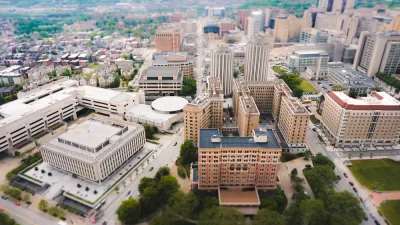A new analysis of developer-initiated rezonings in Louisville, Kentucky sheds light on how the land use regulation system works.

Zoning amendments in Louisville, Kentucky are more likely to reflect wealthy neighborhoods, according to new research from the Urban Institute.
In the article linked below, Lydia Lo and Yonah Freemark present the finds of a recent study that examined a new dataset of all rezoning applications from 2010 to 2020 in the combined Louisville–Jefferson County jurisdiction (Metro). For those who might not be familiar with the Louisville region, that means the dataset covers the merged city-county government and several other incorporated municipalities. The researchers also researched alongside Metro’s ongoing racial equity review of its zoning code and processes.
“[T]he system as a whole—including the housing market and the rezoning approval process—advantages wealthy neighborhoods in the process of managing development,” according to the article. “Developer interest in investment— indicated by the number of building permits and rezoning applications—centers on wealthier, more expensive neighborhoods in Louisville,” and local governments approve most of the zoning amendments they encounter, but at differing rates based on the neighborhoods where they are proposed.
More findings from the evaluation, and a link to the full report, can be found below.
FULL STORY: Influencers, Bias, and Equity in Rezoning Cases

Planetizen Federal Action Tracker
A weekly monitor of how Trump’s orders and actions are impacting planners and planning in America.

Maui's Vacation Rental Debate Turns Ugly
Verbal attacks, misinformation campaigns and fistfights plague a high-stakes debate to convert thousands of vacation rentals into long-term housing.

San Francisco Suspends Traffic Calming Amidst Record Deaths
Citing “a challenging fiscal landscape,” the city will cease the program on the heels of 42 traffic deaths, including 24 pedestrians.

Amtrak Rolls Out New Orleans to Alabama “Mardi Gras” Train
The new service will operate morning and evening departures between Mobile and New Orleans.

The Subversive Car-Free Guide to Trump's Great American Road Trip
Car-free ways to access Chicagoland’s best tourist attractions.

San Antonio and Austin are Fusing Into one Massive Megaregion
The region spanning the two central Texas cities is growing fast, posing challenges for local infrastructure and water supplies.
Urban Design for Planners 1: Software Tools
This six-course series explores essential urban design concepts using open source software and equips planners with the tools they need to participate fully in the urban design process.
Planning for Universal Design
Learn the tools for implementing Universal Design in planning regulations.
Heyer Gruel & Associates PA
JM Goldson LLC
Custer County Colorado
City of Camden Redevelopment Agency
City of Astoria
Transportation Research & Education Center (TREC) at Portland State University
Jefferson Parish Government
Camden Redevelopment Agency
City of Claremont





























